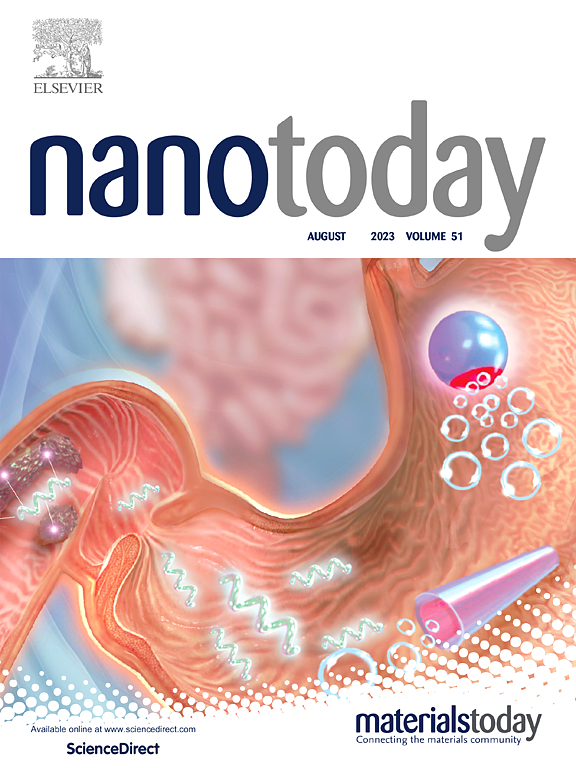利用脾脏靶向可离子化脂质纳米颗粒原位工程设计 mRNA-CAR T 细胞,以消灭癌细胞
IF 13.2
1区 材料科学
Q1 CHEMISTRY, MULTIDISCIPLINARY
引用次数: 0
摘要
嵌合抗原受体(CAR)T 细胞疗法在治疗 B 细胞淋巴瘤方面取得了令人瞩目的进展。然而,CAR T 细胞复杂的生产过程和对实体瘤穿透的阻碍仍然是巨大的挑战。有趣的是,利用可离子化脂质纳米颗粒(mRNA-LNPs)进行细胞靶向递送信使核糖核酸(mRNA)能够高效、精确地改造体内的T细胞和其他免疫细胞,使其发挥功能。在这里,我们利用可离子化的 LNPs 封装了编码抗酪氨酸酶相关蛋白 1(TRP1)CAR 的 mRNA(CAR-LNPs),用于在体内生成 mRNA-CAR T 细胞以消灭黑色素瘤细胞。具体来说,抗 CD3 抗体(aCD3)武装的 mRNA-LNPs (CD3-mRNA-LNPs)可选择性地靶向 T 细胞,从而在体内外产生功能性和治疗水平的 CAR T 细胞。这些 CD3-CAR-LNPs 工程化 CAR T 细胞能够渗入实体瘤,并有效清除 TRP1 高表达的黑色素瘤细胞,从而大大阻碍了肿瘤的进展。重要的是,CD3-7CAR-LNPs含有编码CAR和白细胞介素-7(IL-7)的mRNA,能产生分泌IL-7的7CAR T细胞,从而增强CAR T细胞和其他瘤内细胞毒性T细胞的活性和增殖。另外,使用抗程序性细胞死亡蛋白 1 抗体(aPD-1)可保护 mRNA-CAR T 细胞免于衰竭,尤其是与 CD3-7CAR-LNPs 结合使用时,可显著增强 CAR T 细胞的抗肿瘤能力,而不会引起急性细胞因子释放综合征(CRS)。本文章由计算机程序翻译,如有差异,请以英文原文为准。
In situ engineering of mRNA-CAR T cells using spleen-targeted ionizable lipid nanoparticles to eliminate cancer cells
Chimeric antigen receptor (CAR) T cell therapy has implemented impressive advances in the treatment of B-cell lymphoma. However, the complex production process of CAR T cells and hindrance of solid tumor penetration remain substantial challenges. Intriguingly, cell-targeting delivery of messenger RNA (mRNA) with ionizable lipid nanoparticles (mRNA-LNPs) is able to efficiently and precisely engineer T cells and other immune cells in vivo to perform their functions. Herein, we harnessed the ionizable LNPs to encapsulate mRNA encoding anti-tyrosinase related protein 1 (TRP1) CAR (CAR-LNPs) for in vivo generation of mRNA-CAR T cells to eliminate melanoma cells. Specifically, the anti-CD3 antibody (aCD3) armed mRNA-LNPs (CD3-mRNA-LNPs) selectively targeted T cells, resulting in the production of functional and therapeutic levels of CAR T cells both ex vivo and in vivo. These CD3-CAR-LNPs engineered CAR T cells were capable of infiltrating into the solid tumor and effectively eliminating melanoma cells with high TRP1 expression, significantly hindering tumor progression. Critically, CD3–7CAR-LNPs containing mRNA encoding both CAR and interleukin-7 (IL-7) generated 7CAR T cells that secreted IL-7, thereby enhancing the activity and proliferation of both CAR T cells and other intratumoral cytotoxic T cells. Alternatively, the employment of anti-programmed cell death protein 1 antibody (aPD-1) protected mRNA-CAR T cells from exhaustion, especially in combination with CD3–7CAR-LNPs, could significantly enhance the antitumor capability of CAR T cells without causing acute cytokine release syndrome (CRS).
求助全文
通过发布文献求助,成功后即可免费获取论文全文。
去求助
来源期刊

Nano Today
工程技术-材料科学:综合
CiteScore
21.50
自引率
3.40%
发文量
305
审稿时长
40 days
期刊介绍:
Nano Today is a journal dedicated to publishing influential and innovative work in the field of nanoscience and technology. It covers a wide range of subject areas including biomaterials, materials chemistry, materials science, chemistry, bioengineering, biochemistry, genetics and molecular biology, engineering, and nanotechnology. The journal considers articles that inform readers about the latest research, breakthroughs, and topical issues in these fields. It provides comprehensive coverage through a mixture of peer-reviewed articles, research news, and information on key developments. Nano Today is abstracted and indexed in Science Citation Index, Ei Compendex, Embase, Scopus, and INSPEC.
 求助内容:
求助内容: 应助结果提醒方式:
应助结果提醒方式:


